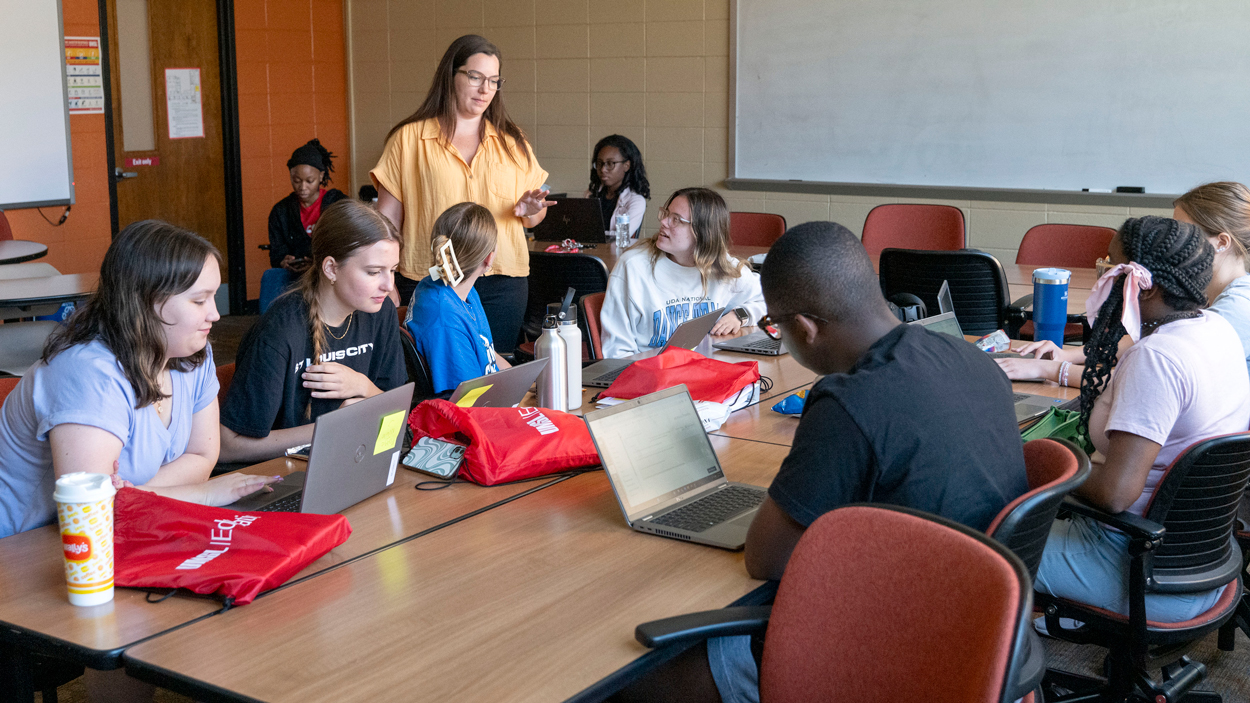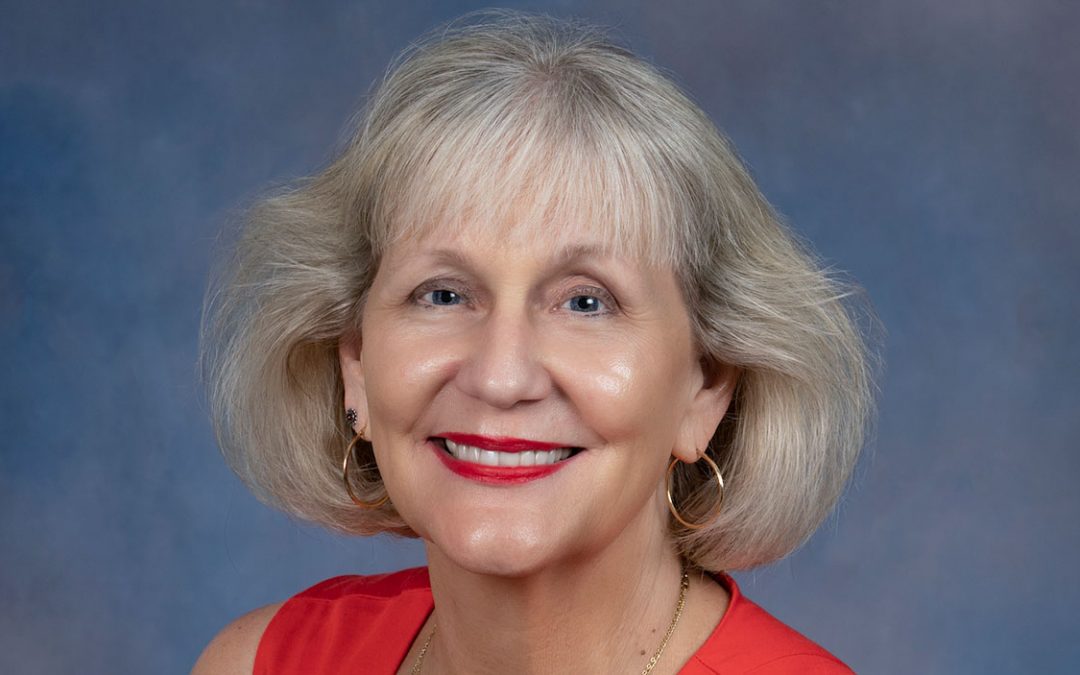
Instructor Cecilia Marino teaches the “Tch Ed 2000: Becoming a Professional Educator” course to a group of prospective educators participating in the Future Teacher Leadership Academy at the University of Missouri–St. Louis. The course serves to ground high school students in the education profession, including its diverse career options and programs offered in the College of Education. (Photo by Derik Holtmann)
The dozen local high school students gathered last week in the Ed Collabitat at the University of Missouri–St. Louis had a seemingly simple task: put together a children’s puzzle.
However, after the pieces were distributed, they learned there were a couple caveats. The students could not speak to each other nor put their own pieces in the puzzle. Unfazed by the challenge, America Brown immediately took the initiative to walk to the center of the room and motioned for everyone to join her.
The group quickly formed a circle and began sorting pieces. In short order, large sections of the puzzle had been solved through a combination of makeshift gestures and other nonverbal cues. In less than five minutes, the group successfully completed the task. Afterward, the students discussed how everyone contributed and the actions they took
The exercise was part of UMSL’s third Future Teacher Leadership Academy. The free two-week program, which ran from June 10-21, is designed to encourage high school students in the St. Louis region to envision careers in education.
“The main aim was to find a way to help provide a pathway for high school students who are interested in becoming teachers someday to get a head start – come to campus and get a little two-week experience of what life might be like for them as a college student and, hopefully, a teacher,” said David Stofer, recruitment coordinator for the College of Education.
The program is a joint effort between the College of Education and the UMSL Office of Precollegiate Services and was funded by the college.
Like the preceding two years, the third FTLA group featured a broad socioeconomic and geographic spectrum, including 12 high school students and recent graduates from 11 private and public schools representing the Brentwood School District, Ferguson-Florissant School District, Hazelwood School District, Maplewood Richmond Heights School District and Normandy Schools Collaborative, among others.
Initially, the project grew from a monthly meeting on recruitment and retention between Stofer; Chanua Ross, director of program operations; Nancy Singer, associate dean and associate professor; and Julie Smith Sodey, director of teacher education and associate teaching professor. The group began brainstorming how to bring high school students to campus beyond traditional open houses, and Ross suggested a summer program. The idea struck a chord, and the group was able to work quickly to bring to the inaugural FTLA group to campus in 2022.
Stofer said exposing high school students to college can motivate them to further their education and help them plan for the future.
“When I first started here and started meeting with our neighboring school districts, the one thing that they all said was, ‘We need to be able to get our students on campus. How can we get our students on your campus?’” he said. “It’s just a way to get them on campus to give them a vision – ‘I could do this and be a college student.’”
The centerpiece of the program is a dual-enrollment course, “Tch Ed 2000: Becoming a Professional Educator,” which ran for 90 minutes each morning. The one-credit class grounded participants in current education practices and informed them about career options and programs offered at the College of Education.
Sessions after the class focused on developing leadership skills and featured a variety of educators who spoke to the students about professional skills, academic preparation and cultural competencies.
The program’s reputation has steadily grown by word of mouth since its inception.
“It’s starting to get legs and really take off because I’m getting students to call me now and ask, ‘Hey, I’d like to come to the FTLA,’” Stofer said. “It really is becoming well-known within the education community in the high schools.”
Last year, the FTLA also added a second cohort for students who had previously completed the program. In the second year, students take another dual-enrollment course for college credit, “Tch ED 1001: Early Clinical Experience: Community Agency,” and also participate in the daily speaker sessions with first-year students. This year’s cohort, which consisted of two students, also worked with the Office of Inclusive Postsecondary Education’s Succeed Program as volunteer counselors during a summer camp, earning experience in the field.
William Schuering, a recent graduate of Brentwood High School, joined the program last summer after it was introduced to him in an elective class at Brentwood for students interested in education careers. His positive experience the first year compelled him to come back for the second cohort.
“I had a lot of fun doing year one, and I was really enjoying the observations and getting out into the field with teaching,” Schuering said. “I liked all of the concepts we talked about in cohort one, and I was really excited to use them in cohort two. It was just kind of a no-brainer for me to come back and keep doing what I enjoy.”
Brown, a rising sophomore at Grand Center Arts Academy, has always known she wanted to be a teacher. As a child, she would even throw a fit when she didn’t get to be a teacher while playing The Game of Life with her family. When her mother informed her about FTLA, she jumped at the chance to participate.
“It’s been fun,” she said. “It’s been interesting, and it’s been educating for me because I used to think, ‘How am I going to figure out all this information without bothering my teachers while they’re trying to work?’ This program helped me find all the answers that I needed.”
Christian Lovelace, a rising junior at Westminster Christian Academy, was inspired to pursue a future career in education by his middle school history teacher, who showed him how teachers can positively impact the lives of young people. That idea was reinforced throughout the two-week program.
“One of the lessons that they taught us is that students need help in any way, shape or form they can get it,” he said. “One of the ways that they can get help is directly from you, the teacher. It is up to the teacher to stand up for the student and to give them a push in the right direction.”
Brown added that she learned the importance of supporting different perspectives in the classroom.
“You have to understand that students come from different cultures, different backgrounds,” she said. “You have to learn how to work with that. So, not pairing students that are all one culture together because that would defeat the purpose of people trying to connect through cultures.”
Schuering recommends the program to any high school student thinking about the possibility of a career in education.
“It’s a wonderful program, and it has so many different positives outside of just teaching,” he said. “When you get to cohort two and you get out there in the field with some of these campers, the activities you get to do are just as fun for you as them. They do a great job of highlighting what makes the UMSL campus and the UMSL community just so wonderful. It’s a great way to get into UMSL as a school. It’s a great way to get into teaching as a field. It’s overall just a really positive experience that you walk away from with a lot of new insight.”














